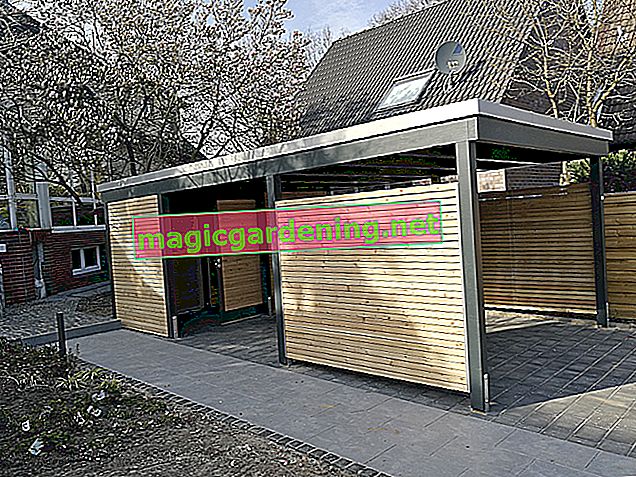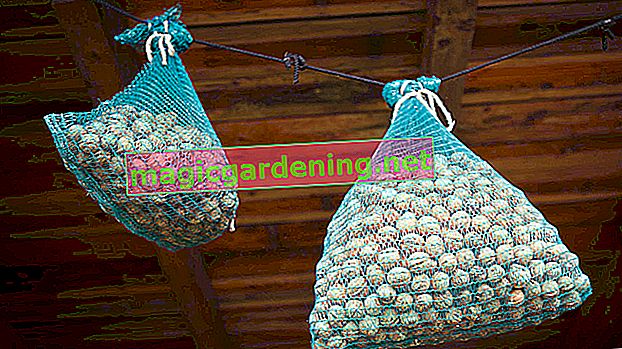
The blueprint
Of course, assuming you have a little background knowledge, you can draw the plan yourself and thus implement your wishes perfectly. Alternatively, there are inexpensive blueprints for various houses on the Internet.
also read
- Great tips on how to build a garden shed with a pent roof yourself
- Extending the garden house - great ideas that are easy to implement
- Build a stone garden house yourself
Danger:
If the arbor requires approval, the construction plan must be signed by an architect or civil engineer.
The building permit
Whether you are allowed to build a garden house (€ 7.70 at Amazon *) without it or whether you need to obtain a building permit beforehand is determined in the provisions of the respective state building regulations. If you are unsure, it is always advisable to go to the responsible authority with the construction plan.
Is the house due to:
- Size or height
- Terrain texture
- or facility (sanitary facilities, heating)
Subject to approval, the authority must approve the plan drawn up by the architect or civil engineer in any case before construction begins.
It's finally time to start building: the foundation
A thread structure marks the future place of the house. You can create the foundation in different ways, below we would like to introduce you to the most common ones.
The slab foundation
This is very easy to make and is therefore very suitable for your self-construction:
- Dig a pit about 35 centimeters deep.
- Cover these with sturdy boards.
- Fill in about 15 centimeters of gravel and compact it with a vibrating plate (€ 214.60 on Amazon *).
- This is followed by a layer of concrete, a drawn-in steel mat and another layer of concrete.
- Smooth the surface with a squeegee.
The strip foundation
Here, thick concrete is only poured under the load-bearing walls; ten centimeters of material is sufficient for the floor slab itself. However, in order to withstand severe frosts, the strips must reach at least eighty centimeters in depth. A mini excavator is very helpful for this work.
The point foundation
The point foundation usually consists of nine concrete individual foundations, whereby the number can vary depending on the size of the self-built garden house.
- From the lacing frame, stretch crossed cords in the middle to determine where the pits for the foundation have to be dug.
- Dig square holes forty centimeters on each side and eighty centimeters deep.
- Board depending on the soil and fill with concrete.
Alternatively, you can lay a stable base made of concrete slabs or place the house on a wooden substructure.
The wood: the best quality is just good enough
Wood is a living material that can tear and change shape. You should therefore ensure that the material used is of high quality. It is extremely important to thoroughly paint all wooden parts with wood protection paint before assembling them. This protects the self-construction from mold and weathering and is therefore a guarantee for longevity.
Set up the stud frame
A look at the construction plan shows: Now it is time to construct the side beams, which are the basis for every wall. Thanks to the stable substructure, you can either screw the posts directly to the U-post bases anchored in the base or first attach a wooden substructure to the foundation.
It is important to carefully install all of the center and cross beams listed in the instructions, as these ensure good stability in the DIY garden shed.
The roof construction
If you have decided on a classic roof with two slopes, the ridge beam is attached first. From this go the rafters, which are held in place by special rafter brackets. Screw the shuttering boards onto this.
The walls
Our DIY garden shed is still feeling the time to finally put the walls on. As with the roof, shuttering boards are used here, which are cut to the length of the side walls and screwed to the beams of the post construction.
Don't forget the cutouts for the windows and doors. You can also build the front door yourself or, alternatively, use a ready-made model from a retailer. Depending on the construction of the house, the windows are installed directly during the wall installation or afterwards.
The floorboards
Whether you put a wooden floor in the garden shed depends on the substructure and the later use. If only garden tools or bicycles are housed in the house, the floor must be robust and easy to care for, a concrete or slab substrate is sufficient here. A wooden floor, on the other hand, looks cozier and transforms the garden house into a second living room.
Cover the roof
Now it's almost done, only the roof still needs to be covered. Simple roofing felt offers sufficient protection, but is not as stable as other roofing. That is why it often only forms the first layer. You can put sturdy bitumen shingles, which are available in many beautiful designs, or roof tiles over these.
Tips
You can easily recycle existing materials for your own garden shed. A disused front door, still good but already weathered boards or old clapboards give the house a very special charm.









